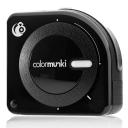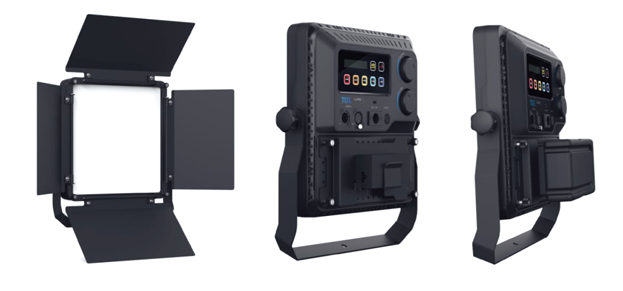
-
Just found this. With lots of interest in iPhone style color meters, this looks like it can use your existing X-Rite style display calibration meter, and an Android tablet to capture the complete spectrum of on-set lighting. Very useful for accurate white balance. (.44 lighting is discussed)
http://www.argyllcms.com/pro/index.html
http://www.argyllcms.comTri-stimulus & Spectral measurement in Emissive, Ambient, Reflective, Transmissive & Flash measurement modes. Display Refresh rate.
Chromaticity and Spectral graphic display.
Configurable readouts of any measurement combination.
Current measurement, reference measurement and White, Black, Red, Yellow, Green Cyan, Blue and Magenta Primary measurement registers. CIE XYZ based tri-stimulus colorspaces: XYZ, Yxy, Yu'v', Lab*, LChab, Luv, LCh*uv & DIN99 Lab. Component differences between the Reference and the Measurement CIE XYZ based tri-stimulus colorspaces. Delta E between Reference and the Measurement: CIE Delta E 76, CIE Delta E 94,CIE Delta E 94 Textile, IE Delta E 2000, CMC Delta E 2:1, CMC Delta E 1:1, DIN99 Delta E. Density: Visual Density, Status A Density, Status M Density, Status T Density, Status E (DIN) Density, ISO Type 1 & 2 Density. Photography specific: Incident illuminance, reflected luminance, flash measurement, Exposure Value (EV), Interactive Exposure Calculator. Color Temperature, Delta Color Temperature, Black Body or Daylight, Correlated or DE2000, Kelvin or Mired. Configurable RGB colorspace including BT.709, BT.2020, DCI-P3, custom, BT.1886, Delta RGB, RGB or CMY Adjustment Direction. Color Rendering Index (CIE 1995 Ra + R9), Television Lighting Consistency Index (EBU TLCI-2012 Qa) Visual Contrast ARPANSA UV Exposure Web RGB, Visual Compare Swatches, Named Color, Named Color Visual Swatch, with installable CxF or ICC Palettes. Save and Restore ColorMeter and Instrument configurations.
Instruments supported: JETI specbos: 1211 & 1201 Image Engineering EX1 Klein: K1, K8, K10, K10-A X-Rite: DTP20, DTP94, ColorMunki Design or Photo, ColorMunki Create or Smile, Eye-One Display Pro, ColorMunki Display, OEM i1d3 instruments, Eye-One Pro2 Gretag-Macbeth: Eye-One Pro, Eye-One Monitor, Eye-One Display 1 or 2 or LT, HP DreamColor or APS, CalMAN X2, Huey Sequel Imaging: MonacoOPTIX Lacie Blue Eye DataColor: Spyder 2, Spyder 3, Spyder 4 & Spyder 5 SwatchMate Cube, with improved color accuracy. Video Test Pattern Generator (TPG) Capability: By making use of a ChromeCast, ColorMeter can act as an HDMI Video Test Patch and Test Card source. While the ChromeCast is not a bit perfect TPG, the use of dithering makes it accurate to within perceptual limits. It can be used to display one of six standard Test Cards, covering Display geometry, Probe locations, Low clipping, High clipping, Neutrals and Color ramps. It can also be used to display a test patch color that matches the reference RGB value Readout, which combined with continuous measurement mode and Delta E and RGB adjustment Readouts, gives color by color Video calibration capability. System Requirements: USB On The Go (OTG) capable Android tablet or phone.
Recommended screen size of 94 mm (3.7 inches) or greater. Android V4.0 (Ice Cream Sandwich) or later. USB OTG adapter lead. BlueTooth LE for connecting with SwatchMate Cube via Bluetooth.The exact capabilities depend on the type of instrument you are using.
Current price looks like $99 so not cheep, but much cheeper than buying custom iPhone light meter, or dedicated light meter. Also you may already own the hardware for other calibration purposes!
-
Note that only spectrophotometers will do to measure spectrum.
-
May be possible to use a cheep meter (i1 Display Pro) and measure spectrum of stationary light in a controlled location (not on set- but to check your LED's for example) by taking multiple readings, similar to how a monitor is calibrated?
Other than that at least it may be more accurate way to measure white balance on-set than most, but that would depend on measurement device accuracy.
-
Nope, You need at least ColorMunki Photo/Design.
Cheap meters are similar to camera sensors, they are unable to measure spectrum.
-
This one? Probably need to upgrade soon anyway.

 cmunph-1024x1024.jpg1024 x 1024 - 159K
cmunph-1024x1024.jpg1024 x 1024 - 159K -
Yep. Watch ebay for some time.
-
Looking at our link it is rgb like sensor, not spectrophotometer.
Same as cheap color meters.
-
I was considering the LUMI before I saw this solution. Having transitioned my LED lights to TGL I can see the difference in CRI and light quality in my work, so its also great to know what other lighting is doing on set, or reflecting around etc. So you can make a decision based in science.
I have been looking at other light meters but they are quite expensive, or lacking features (like the LUMI).
What I think is great is that such calibration devices can be very useful for monitor- projector- print calibration as well. So useful. Remember- correct color no only improves 'color' but also brightness, and to some extent noise.
-
-
@CFreak TGL make some very high CRI Soft LED lights. The LED's are behind a diffuser which is great for close lighting as the light is very very soft. They are quite high end price wise, with limited distribution, not on ebay yet I don't think.


 luniq50.png800 x 1244 - 113K
luniq50.png800 x 1244 - 113K
 Screen Shot 2016-05-28 at 2.40.55 pm.png623 x 291 - 94K
Screen Shot 2016-05-28 at 2.40.55 pm.png623 x 291 - 94K
Howdy, Stranger!
It looks like you're new here. If you want to get involved, click one of these buttons!
Categories
- Topics List23,964
- Blog5,723
- General and News1,342
- Hacks and Patches1,151
- ↳ Top Settings33
- ↳ Beginners254
- ↳ Archives402
- ↳ Hacks News and Development56
- Cameras2,361
- ↳ Panasonic990
- ↳ Canon118
- ↳ Sony154
- ↳ Nikon96
- ↳ Pentax and Samsung70
- ↳ Olympus and Fujifilm99
- ↳ Compacts and Camcorders299
- ↳ Smartphones for video97
- ↳ Pro Video Cameras191
- ↳ BlackMagic and other raw cameras121
- Skill1,961
- ↳ Business and distribution66
- ↳ Preparation, scripts and legal38
- ↳ Art149
- ↳ Import, Convert, Exporting291
- ↳ Editors191
- ↳ Effects and stunts115
- ↳ Color grading197
- ↳ Sound and Music280
- ↳ Lighting96
- ↳ Software and storage tips267
- Gear5,414
- ↳ Filters, Adapters, Matte boxes344
- ↳ Lenses1,579
- ↳ Follow focus and gears93
- ↳ Sound498
- ↳ Lighting gear314
- ↳ Camera movement230
- ↳ Gimbals and copters302
- ↳ Rigs and related stuff272
- ↳ Power solutions83
- ↳ Monitors and viewfinders339
- ↳ Tripods and fluid heads139
- ↳ Storage286
- ↳ Computers and studio gear560
- ↳ VR and 3D248
- Showcase1,859
- Marketplace2,834
- Offtopic1,319







